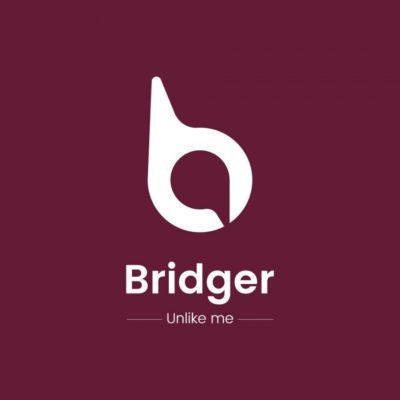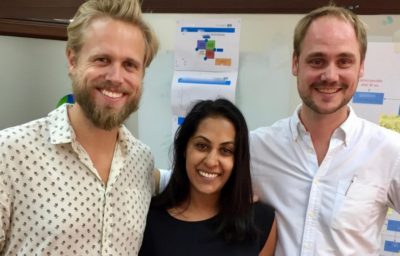Bridger – Discussing Differing Opinions
Some people debate to improve their skills, some for the competition and some for an ideal of discourse or knowledge. For the latter, we’d like to present an opportunity to engage in conversations with people from all around the world to exchange and discuss differing views: Bridger. The newly developed app just got publicly available, so we thought it a good time to have in interview with the people behind it.

© Bridger
Achte Minute: Hello there! Could you introduce yourselves?
Sharlene Ramkissoon: My name is Sharlene. I’m originally from Canada, but I’m currently in Lebanon. I come from a background of international development work, basically reducing poverty, and I work with governments and help them to strengthen their social welfare systems. I’m workaholic, so I don’t have much to add to that.
Tobias Köhler: Hi there, I’m Tobi, I’m German. I currently also live in Lebanon and I work in the humanitarian field. I’m an expert on anything related to the laws of war, like the Geneva Conventions, and I know these guys privately so we decided to do this.
Pål Mathisen: My name is Pål, I work in event business in Norway. I just came back from Beirut where I lived for two years, like Sharlene and Tobi. And for the last two years I’ve been working full time on developing Bridger.
AM: What is Bridger?
S: Who wants to do the elevator pitch?
T&P: Go for it.
S: We’ve tried to really boil this down to a sentence, and the essence is that Bridger is a platform that allows people to engage anonymously with people unlike themselves, about topics that matter to them. And to give you some background: This came out of a dinner conversation, where we’d been discussing some world events that were quite shocking to us, namely Brexit and the American presidential elections. It weren’t actually the results that shocked us, but rather the fact that we were not aware there would be so many people feeling and voting that way, and the distance between us in terms of not being in touch across these spectrums. This showed us that we should really try to burst out of our filter bubbles and sort of contribute to reducing polarization, to give people a tool to do that, an accessible tool.
P: And that’s when the idea came: You know, in dating apps these days you create a profile and get matched with people who are like you. And we thought, why not take that concept and turn it around? And five minutes into that conversation we had both concept and name ready. That was the beginning of it.
S: And I think, you know, we had a lot of discussions and a lot of focus groups to really determine the key features: Should it be one on one, should it be anonymous? In that context we tried to engage both people like and unlike ourselves, and realized that without the correct tool, that is rather difficult. Which went back to reinforce our belief that this is really really needed. Tobs, anything to add?
T: No, you hit the nail on the head.
P: Then some time passed and both Sharlene and I were pitching the idea to friends, and people really liked the idea. I was at the end of my paternity leave and I thought “what should I do now?” since I had one more year to live in Beirut. And the answer was easy: “Why not dedicate my time to do this?” I called Sharlene and asked “Would you want to do it?” and she thought about it for half a second before answering yes. And when I asked Tobi, he also was also super positive. Next, we sat down to design the solution.
S: The project was self-funded, obviously, and the only thing we had invested in was a flipchart which is now with me. But that came to good use. We all have very different strengths and weaknesses but we all tend to balance each other very well, in terms of how this process went. The ideas went back and forth, and we weren’t afraid of shooting each other’s ideas down if needed. This was our main asset, I believe. So the idea, the look and feel, how the interaction should go, even how people are matched based on their feelings about particular statements, is all based on us talking it through.
T: And pretty soon we realized we needed a legal frame for this, so we established a company and started looking for IT developers…
S: Which is a great story!
T: Exactly. Paul´s wife met our developer in a ski lift in Lebanon.

The faces behind Bridger: Pål Mathisen, Sharlene Ramkissoon,
Tobias Köhler (left to right) – © Bridger
AM: You said that you hired programmers. Did you find some sponsors or is Bridger selling anything?
P: We were planning to reach out to investors but after talking to a guy in the tech industry, he told us there are so many start-ups, that investors won’t be interested unless you have it launched and a growing user base. So we put all our energy into development and it’s basically our savings going in there. That’s also why we don’t have an Android version yet. We decided to first develop for iOS, and once we´ve found a sponsor, we can easily develop for Android.
AM: And is it meant to bring profits in the future?
T: We do want it to be self-sustaining, and there are some ideas of how that could work, for example having advertisement and offering ad-free subscriptions. But we’re also thinking about other ideas, such as offering private “discussions spaces” for groups of people, like a school class or company wanting to use it to debate a particular subject.
S: But we said we first want to see how people use it, and if we see that people use it in a particular way, even different from what we imagined, then we’re open to make adjustments. The reason we haven’t specified how it is supposed to be used, is that we want the users to tell us what we should be doing. I do think that you and the readership of your magazine are probably the ideal users: People who are open and want to convince others, but who are also are open to being convinced. But we also want to reach out to people who have isolated themselves in a bubble to see if we can try to have them become part of Bridger.
What’s the state of Bridger now?
P: We are currently working on two main tasks: marketing is one. We´re currently using social media channels and our private network to reach out to people who might be interested in trying Bridger out. We´re contacting magazines who are interested in polarization, asking them to try out Bridger and possibly sharing it with their network. As you mentioned, we need a larger user-base, to ensure there are enough people “unlike you” when you log on to Bridger. That’s what we currently working for; making sure we reach a critical mass. The second effort is making adjustments in the app, to make it easier and more intuitive for people to use it. Based on input from our users, we are making adjustments to improve the platform. We are also planning to do a Kickstarter campaign to fund the Android development.
AM: Now, if someone read this article and found the idea nice, what could they do to participate?
P: They could either sign up on the webpage – which works well on Android as well – or, if they have an iPhone, they should download the app, answer the first questions and have a go. If they want information aside from what’s in this article, they could go to https://about.bridger-app.com. That’s our main landing page in addition to our Facebook page. They can find our press release there, people can read up on our privacy policy (people want to know what happens to their data), and there’s also a tutorial video. If anyone wonders how to use the app, that’s where people can get easy information. We’re also working on some simple illustrations on how to use the platform.
S: We are building up our userbase, but we are also building up a community, so if people want to reach out to others who might like the idea, we would like to encourage them. The idea is really to contribute by reaching people who are unlike you, so the goal is to reach different networks.
P: Yes, we are really depending on people helping us spread the word, like you’re doing with this article.
AM: Ok. Would you like to add anything?
P: There are a couple of things I’d like to add: Like why should people consider using Bridger. Bridger is first and foremost an easy way to get matched with people unlike you. It is also valuable for people who a looking for a place to train and develop their debating skills. Once we’ve developed the app even further, we should be able to provide extensive statistics, allowing you to drill down into your own stats to analyze which topics you do really well with, and what profiles you score highest when debating with (based on the Bridger rating system). So, for anybody who is interested in debating, I think that Bridger might be an excellent training platform.
Bridger is also a place for those who are curious, and who might be in doubt about certain topics. For those people, Bridger is a great place to seek out information, and listen to arguments from someone unlike themselves. When we decided that Bridger would be anonymous, it wasn´t only for security, but also to allow people to speak their mind without being afraid of the witch hunt that happens online. We also decided to have one-on-one chats and incentive systems, like rating, to prevent people from trolling. We want to motivate people to debate and to spend their time Bridging across the political divide. I mean, we are competing for people’s time, so we really hope we can motivate them to log on and help combat polarization.
AM: We wish you good luck with that! Thank you for the interview!
The interview was conducted by Lennart Lokstein.
Mittwochs-Feature: Every Wednesday the Mittwochs-Feature features an idea, interview or book regarding debate – usually in German, sometimes in English, sometimes both. If you would like to do a feature regarding a certain topic please mail us your idea to team [at] achteminute [dot] de.






